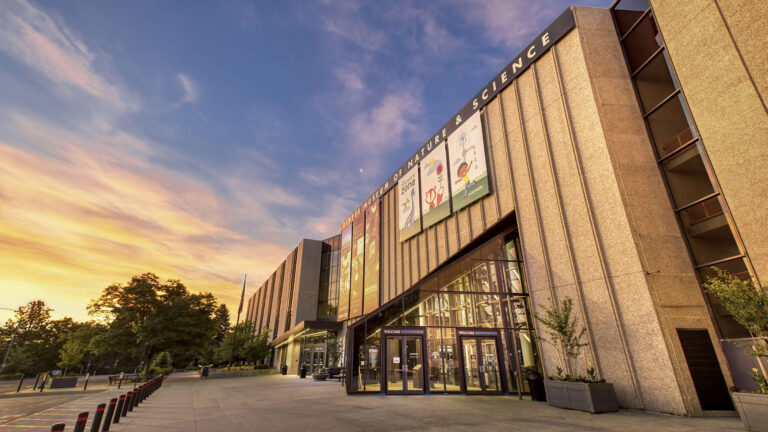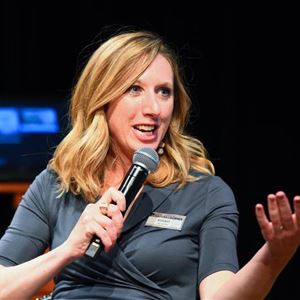
ESAL had the opportunity to connect with Kristan Uhlenbrock, Executive Director of the Institute for Science & Policy and the Denver Museum of Nature and Science in the fall of 2024, and then again at the Colorado Convening hosted by ESAL and the kick-off event for the Trust in Science series in July 2025.
This interview has been edited for clarity and length and includes updates provided after the initial interview.
ESAL: Tell us about the Institute for Science & Policy (ISP) at the Denver Museum of Nature and Science.
Kristan Uhlenbrock:
The idea for the Institute first originated in 2016, when the Denver Museum of Nature and Science was looking for ways to respond to growing politicization of science. The museum is a longstanding, science-based museum that is highly trusted and apolitical, and the mission of the Institute is to bring people together to work through hard problems while centering science in the conversation. I think of ISP as a combination of the work of nonprofit engagement and that of a think tank: we do community engagement work and produce helpful and technically specific products for policymakers to use. We are apolitical, but engage in political conversations. Our work is centered around people and the need to understand both the scientific information and how people receive and engage with that information.We try to break down the intense rhetoric around certain topics to get to conversations about the problems we are trying to solve.
ESAL: What is an example of the type of projects you coordinate at the ISP?
KU: The ISP hosts convenings where we get together a group of 15 to 20 people to discuss a science policy issue. One convening we hosted was focused on water, which, living in the West, is an extremely important and dwindling vital resource. There’s this saying, “whiskey is for drinking and water is for fighting,” and that is very relevant here in Colorado. For this convening, we gathered about 20 stakeholders together. We had three different scientists focused on climate change, atmospheric science, and water science, as well as water managers, farmers, producers, lawyers, policy wonks, advocates, and Indigenous representation. That group met over four months for full days at a time to build relationships and understand where each other's perspectives were coming from to create a vision of what they thought our water challenges were going to be and the pathways to get there in the future.
Having scientists and technical experts at the table was extremely valuable, not only to them but to the process. They learned how their information can be presented in a way that is really useful to folks who need to make decisions or need that information in their community. Everyone involved gets to learn about how to interact when there is a diversity of stakeholders and interests. Because of the different perspectives involved, these gatherings allow for fascinating conversations that are illuminating on all sides. Ultimatey, this group created a report called The Roadmap to Better Decisions, which is really a process-focused report that they can use in their own lives and that others can use to set up a process like this.
ESAL: How do you connect with scientists as part of this work?
KU: I come from the sciences, and through my career have built up relationships with many people invested in the questions we take on at the Institution. I view myself as the translator between communities. Prior to this role, I was with a national laboratory, University Corporation for Atmospheric Research/National Center for Atmospheric Research (NCAR/ UCAR), where I worked on an interagency climate program for about five years. So, I have a depth of knowledge and relationships in the climate and atmospheric sciences, and I know a ton of people in that space. I then can use those strong relationships as connectors to other people in a larger network. I have also built relationships with our university partners and colleges, so I know who to go to when I am looking for people and ask them who would be a good fit for our projects. I then interview candidates to understand their interests, challenges, and skills that they bring to the table.

ESAL: What initiatives are on the horizon for the ISP?
KU: We are building out fellowship opportunities, where scientists will be fellows at the Institute working on the issues we engage with. I am also working to launch a fellowship opportunity this year to place fellows in our state legislature, the Colorado Science & Technology Policy Program. We are creating a model that works for Colorado and learning from other examples, such as the AAAS fellowship in D.C. and California Council on Science and Technology (CCST), which have the most robust programs embedding scientists and technical experts in government. We have an amazing network and coalition of states that are focused on creating these science and technology policy fellowships to serve state houses, and we support each other as we navigate the diversity of how each state governs. As of this fall, we have selected our first cohort of four fellows for 2025-2026 and are excited for them to have the opportunity to serve the Colorado statehouse.
We are also hosting a public event series called Trust in Science. The kick-off event in July was on the Science of Trust, and our next event in September will be on trust and vaccines. These events are hosted at the Museum, with some being streamed. You can watch the recording of the Science of Trust event here. (Kristan briefly discussed the latest at the ISP with us, view the video on ESAL social media.)
ESAL: What issues do you think are important for STEM professionals to engage around?
Misinformation and disinformation are critical issues right now. We are seeing a change in how scientists and institutions are trusted, with a decline overall but sometimes based on political affiliation or education. However, overall, scientists are highly trusted, generally at a higher rate than politicians or other institutions. Scientists are starting from a strong place as trusted messengers, and they have a responsibility to explain scientific information in an accessible way. We know that people have higher trust in the places where they live, and scientists are members of those communities–they are not separate. If you get outside your inner circle, you can help with bigger challenges. People will trust you because they know you. Tackling information can be at a large scale and at the local level.
ESAL: What advice do you have for scientists looking to engage in science policy work?
This work takes stamina. Change is slow. You need to think long-term. Keep your scientific curiosity when approaching policy and engagement. There are windows of opportunity, and you need to be prepared to use them. You have to connect with people you disagree with and find common values and interests to work on the hard problems together. Stick with it, and take a long game approach.
ESAL: How can scientists connect with you and the ISP?
I try to keep an open door policy, even though sometimes my responsibilities prevent that from always being the case. You can connect with me on LinkedIn and follow the ISP mailing list. We have small group meetings of scientists with the Institute leadership a few times a year, and you can get in touch if you are interested in being involved.
Do you have a story to tell about your own local engagement or of someone you know? Please submit your idea here , and we will help you develop and share your story for our series.